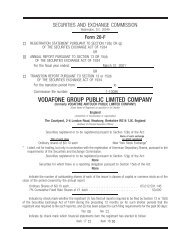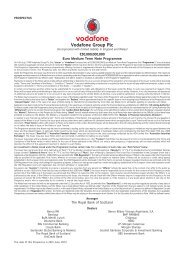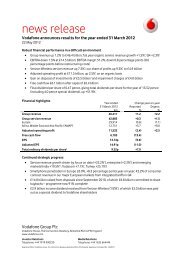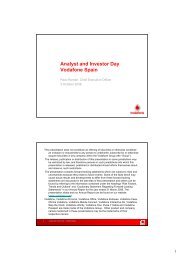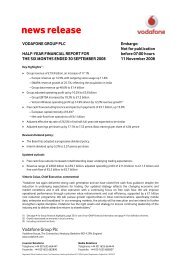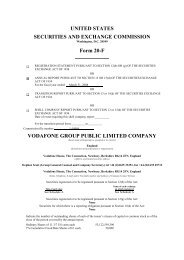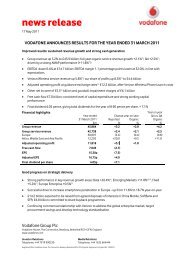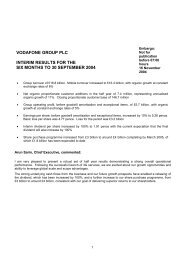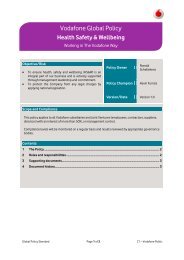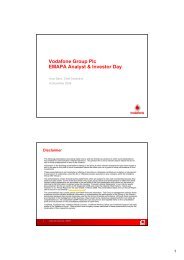Create successful ePaper yourself
Turn your PDF publications into a flip-book with our unique Google optimized e-Paper software.
<strong>Vodafone</strong> – Additional Information<br />
Shareholder Information continued<br />
entitlement to <strong>the</strong> B share continuing dividend up to <strong>the</strong> future redemption date<br />
immediately before <strong>the</strong> liquidation. The holders of B shares do not have any o<strong>the</strong>r<br />
right to share in <strong>the</strong> Company’s surplus assets.<br />
Pre-emptive rights and new issues of shares<br />
Under Section 80 of <strong>the</strong> Companies Act 1985, directors are, with certain<br />
exceptions, unable to allot relevant securities without <strong>the</strong> authority of <strong>the</strong><br />
shareholders in a general meeting. Relevant securities as defined in <strong>the</strong><br />
Companies Act include <strong>the</strong> Company’s ordinary shares or securities convertible<br />
into <strong>the</strong> Company’s ordinary shares. In addition, Section 89 of <strong>the</strong> Companies Act<br />
1985 imposes fur<strong>the</strong>r restrictions on <strong>the</strong> issue of equity securities (as defined in<br />
<strong>the</strong> Companies Act, which include <strong>the</strong> Company’s ordinary shares and securities<br />
convertible into ordinary shares) which are, or are to be, paid up wholly in cash<br />
and not first offered to existing shareholders. The Company’s Articles of Association<br />
allow shareholders to authorise directors for a period up to five years to allot<br />
(a) relevant securities generally up to an amount fixed by <strong>the</strong> shareholders and<br />
(b) equity securities for cash o<strong>the</strong>r than in connection with a rights issue up to<br />
an amount specified by <strong>the</strong> shareholders and free of <strong>the</strong> restriction in Section 89.<br />
In accordance with institutional investor guidelines, <strong>the</strong> amount of relevant<br />
securities to be fixed by shareholders is normally restricted to one third of <strong>the</strong><br />
existing issued ordinary share capital, and <strong>the</strong> amount of equity securities to be<br />
issued for cash o<strong>the</strong>r than in connection with a rights issue is restricted to 5%<br />
of <strong>the</strong> existing issued ordinary share capital.<br />
Disclosure of interests in <strong>the</strong> Company’s shares<br />
There are no provisions in <strong>the</strong> Articles of Association whereby persons acquiring,<br />
holding or disposing of a certain percentage of <strong>the</strong> Company’s shares are required<br />
to make disclosure of <strong>the</strong>ir ownership percentage, although such requirements<br />
exist under rules derived by <strong>the</strong> Disclosure and Transparency Rules (“DTRs”).<br />
The basic disclosure requirement upon a person acquiring or disposing of shares<br />
carrying voting rights is an obligation to provide written notification to <strong>the</strong><br />
Company, including certain details as set out in DTR 5, where <strong>the</strong> percentage<br />
of <strong>the</strong> person’s voting rights which he holds as shareholder or through his direct<br />
or indirect holding of financial instruments (falling within DTR 5.3.1R) reaches<br />
or exceeds 3% and reaches, exceeds or falls below each 1% threshold <strong>the</strong>reafter.<br />
Under Section 793 of <strong>the</strong> Companies Act 2006, <strong>the</strong> Company may, by notice<br />
in writing, require a person that <strong>the</strong> Company knows or has reasonable cause to<br />
believe is, or was during <strong>the</strong> preceding three years, interested in <strong>the</strong> Company’s<br />
shares to indicate whe<strong>the</strong>r or not that is correct and, if that person does or did<br />
hold an interest in <strong>the</strong> Company’s shares, to provide certain information as set<br />
out in <strong>the</strong> Companies Act 2006. DTR 3 deals with <strong>the</strong> disclosure by persons<br />
“discharging managerial responsibility” and <strong>the</strong>ir connected persons of <strong>the</strong><br />
occurrence of all transactions conducted on <strong>the</strong>ir account in <strong>the</strong> shares in <strong>the</strong><br />
Company. Part 28 of The Companies Act 2006 sets out <strong>the</strong> statutory functions<br />
of <strong>the</strong> Panel on Takeovers & Mergers (<strong>the</strong> “Panel”). The Panel is responsible for<br />
issuing and administering <strong>the</strong> Code on Takeovers & Mergers and governs disclosure<br />
requirements on all parties to a takeover with regard to dealings in <strong>the</strong> securities<br />
of an offeror or offeree company and also on <strong>the</strong>ir respective associates during<br />
<strong>the</strong> course of an offer period.<br />
General meetings and notices<br />
Annual general meetings are held at such times and place as determined by <strong>the</strong><br />
directors of <strong>the</strong> Company. The directors may also, when <strong>the</strong>y think fit, convene<br />
an extraordinary general meeting of <strong>the</strong> Company. General meetings may also<br />
be convened on requisition as provided by <strong>the</strong> Companies Acts.<br />
An annual general meeting and an extraordinary general meeting called for <strong>the</strong><br />
passing of a special resolution needs to be called by not less than twenty-one<br />
days’ notice in writing and all o<strong>the</strong>r extraordinary general meetings by not less<br />
than fourteen days’ notice in writing. The directors may determine that persons<br />
entitled to receive notices of meetings are those persons entered on <strong>the</strong> register<br />
at <strong>the</strong> close of business on a day determined by <strong>the</strong> directors but not later than<br />
twenty-one days before <strong>the</strong> date <strong>the</strong> relevant notice is sent. The notice may also<br />
specify <strong>the</strong> record date, which shall not be more than forty-eight hours before<br />
<strong>the</strong> time fixed for <strong>the</strong> meeting.<br />
Shareholders must provide <strong>the</strong> Company with an address or (so far as <strong>the</strong><br />
Companies Acts allow) an electronic address or fax number in <strong>the</strong> United Kingdom<br />
in order to be entitled to receive notices of shareholders’ meetings and o<strong>the</strong>r<br />
notices and documents. In certain circumstances, <strong>the</strong> Company may give notices<br />
to shareholders by advertisement in newspapers in <strong>the</strong> United Kingdom. Holders<br />
144 <strong>Vodafone</strong> Group Plc Annual Report 2008<br />
of <strong>the</strong> Company’s ADSs are entitled to receive notices under <strong>the</strong> terms of <strong>the</strong><br />
Deposit Agreement relating to <strong>the</strong> ADSs.<br />
Under Section 336 of <strong>the</strong> Companies Act 2006, <strong>the</strong> annual general meeting<br />
of shareholders must be held each calendar year and within six months of <strong>the</strong><br />
Company’s year end.<br />
Electronic communications<br />
The Company may, subject to and in accordance with <strong>the</strong> Companies Act 2006,<br />
communicate all shareholder information by electronic means, including by<br />
making such information available on a website, with notification that such<br />
information shall be available on <strong>the</strong> website.<br />
Variation of rights<br />
If, at any time, <strong>the</strong> Company’s share capital is divided into different classes of shares,<br />
<strong>the</strong> rights attached to any class may be varied, subject to <strong>the</strong> provisions of <strong>the</strong><br />
Companies Acts, ei<strong>the</strong>r with <strong>the</strong> consent in writing of <strong>the</strong> holders of three fourths<br />
in nominal value of <strong>the</strong> shares of that class or upon <strong>the</strong> adoption of an extraordinary<br />
resolution passed at a separate meeting of <strong>the</strong> holders of <strong>the</strong> shares of that class.<br />
At every such separate meeting, all of <strong>the</strong> provisions of <strong>the</strong> Articles of Association<br />
relating to proceedings at a general meeting apply, except that (a) <strong>the</strong> quorum is<br />
to be <strong>the</strong> number of persons (which must be at least two) who hold or represent<br />
by proxy not less than one-third in nominal value of <strong>the</strong> issued shares of <strong>the</strong> class<br />
or, if such quorum is not present on an adjourned meeting, one person who holds<br />
shares of <strong>the</strong> class regardless of <strong>the</strong> number of shares he holds, (b) any person<br />
present in person or by proxy may demand a poll, and (c) each shareholder will<br />
have one vote per share held in that particular class in <strong>the</strong> event a poll is taken.<br />
Class rights are deemed not to have been varied by <strong>the</strong> creation or issue of new shares<br />
ranking equally with or subsequent to that class of shares in sharing in profits or assets<br />
of <strong>the</strong> Company or by a redemption or repurchase of <strong>the</strong> shares by <strong>the</strong> Company.<br />
Limitations on voting and shareholding<br />
As far as <strong>the</strong> Company is aware, <strong>the</strong>re are no limitations imposed on <strong>the</strong> transfer,<br />
holding or voting of <strong>the</strong> Company’s shares o<strong>the</strong>r than those limitations that would<br />
generally apply to all of <strong>the</strong> shareholders. No shareholder has any securities<br />
carrying special rights with regard to control of <strong>the</strong> Company.<br />
Documents on display<br />
The Company is subject to <strong>the</strong> information requirements of <strong>the</strong> US Securities and<br />
Exchange Act of 1934 applicable to foreign private issuers. In accordance with<br />
<strong>the</strong>se requirements, <strong>the</strong> Company files its Annual Report on Form 20-F and o<strong>the</strong>r<br />
related documents with <strong>the</strong> SEC. These documents may be inspected at <strong>the</strong><br />
SEC’s public reference rooms located at 100 F Street, NE Washington, DC 20549.<br />
Information on <strong>the</strong> operation of <strong>the</strong> public reference room can be obtained in <strong>the</strong><br />
US by calling <strong>the</strong> SEC on +1-800-SEC-0330. In addition, some of <strong>the</strong> Company’s<br />
SEC filings, including all those filed on or after 4 November 2002, are available on<br />
<strong>the</strong> SEC’s website at www.sec.gov. Shareholders can also obtain copies of <strong>the</strong><br />
Company’s Memorandum and Articles of Association from <strong>the</strong> <strong>Vodafone</strong> website<br />
at www.vodafone.com or from <strong>the</strong> Company’s registered office.<br />
Debt securities<br />
Pursuant to an Agreement of Resignation, Appointment and Acceptance, dated<br />
as of 24 July 2007, by and among <strong>the</strong> Company, The Bank of New York Mellon<br />
and Citibank N.A, The Bank of New York Mellon has become <strong>the</strong> successor trustee<br />
to Citibank N.A. under <strong>the</strong> Company’s Indenture dated as of 10 February 2000.<br />
Material contracts<br />
At <strong>the</strong> date of this Annual Report, <strong>the</strong> Group is not party to any contracts that are<br />
considered material to <strong>the</strong> Group’s results or operations, except for its $11.3 billion<br />
credit facilities which are discussed under “Financial Position and Resources” on<br />
page 57.<br />
Exchange controls<br />
There are no UK government laws, decrees or regulations that restrict or affect<br />
<strong>the</strong> export or import of capital, including but not limited to, foreign exchange<br />
controls on remittance of dividends on <strong>the</strong> ordinary shares or on <strong>the</strong> conduct<br />
of <strong>the</strong> Group’s operations, except as o<strong>the</strong>rwise set out under “Taxation” below.<br />
Taxation<br />
As this is a complex area, investors should consult <strong>the</strong>ir own tax adviser regarding<br />
<strong>the</strong> US federal, state and local, <strong>the</strong> UK and o<strong>the</strong>r tax consequences of owning and<br />
disposing of shares and ADSs in <strong>the</strong>ir particular circumstances.




